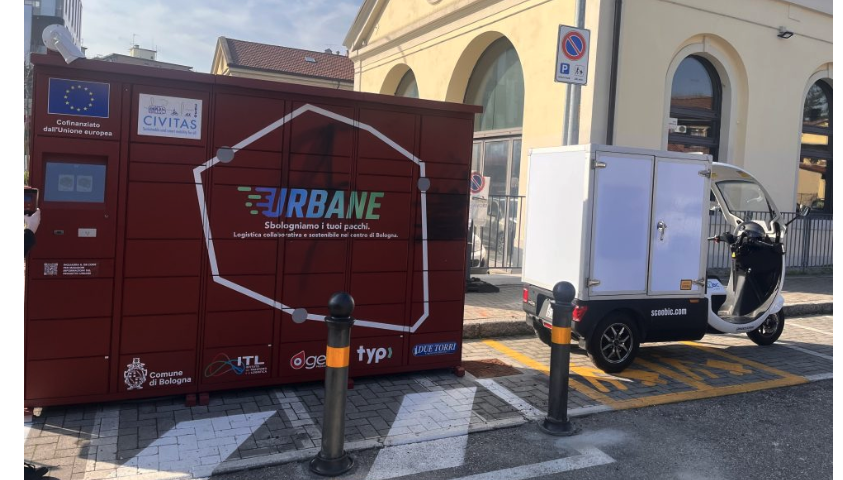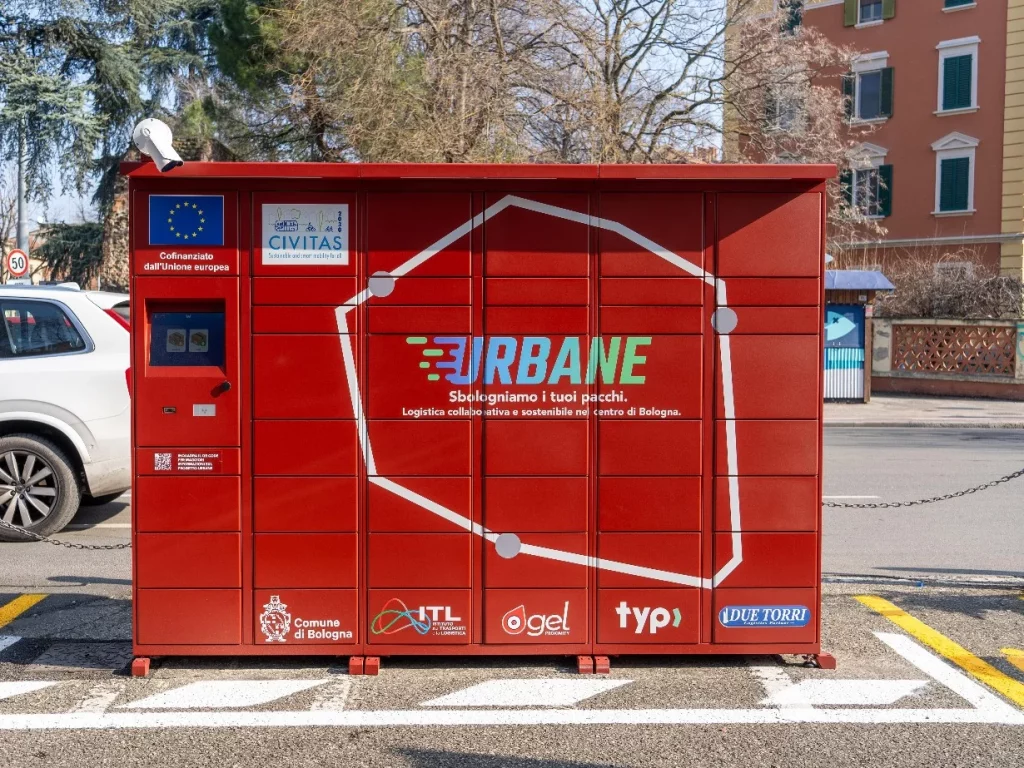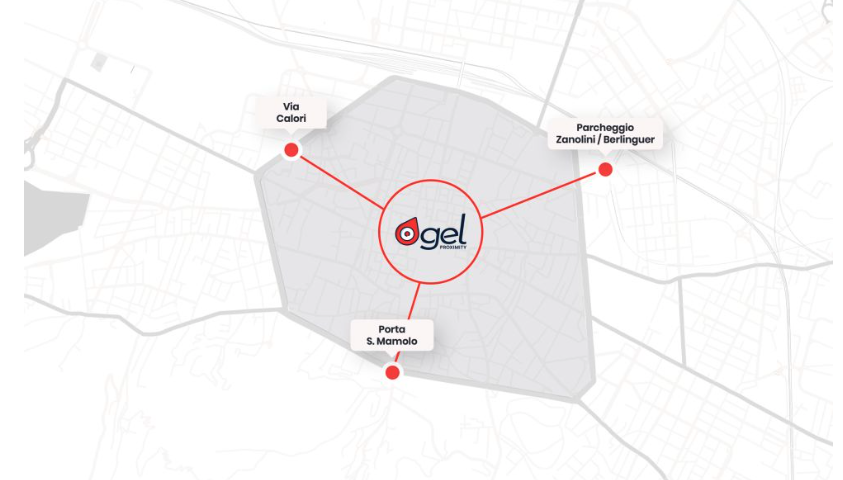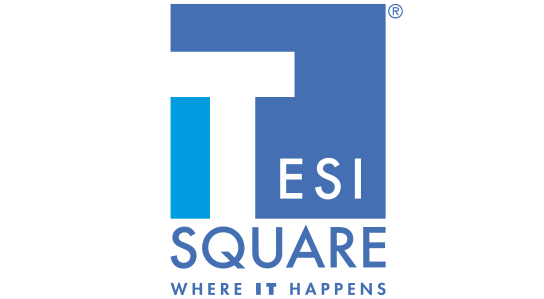The sustainable courier revolution has arrived in Bologna!
URBANE Project , a European project for Sustainable Logistics funded by the Horizon Europe Program, has officially kicked off with the installation of 3 automated microhubs for transferring goods from vans to electric vehicles. The City of Bologna, along with Valladolid, Helsinki and Thessaloniki, is part of the group of four pilot cities that are testing a number of innovative solutions to make the last mile of deliveries, the most emission-intensive part of the logistics process, more sustainable.
GEL Proximity is proud to be part of the local partnership along with ITL, Due Torri Spa and Typ, and which also involves Salerno Trasporti, Ricoh Italia and WIB.
We reproduce below the press release published on the website of the Municipality of Bologna.
Sustainable logistics in the historic center
Bologna kicks off the pilot project for sustainable and collaborative delivery of goods in the historic center. After more than a year of preparatory activities, which led in recent weeks to the installation of 3 automated microhubs for the transfer of goods from traditional vans to electric vehicles, the project has now come into full swing with the first deliveries. These microhubs are the first proximity logistics spaces in the city, envisaged by the Urban Plan for Sustainable Mobility (PUMS), strategically located in areas identified near the boulevards, close to the historic center: porta San Mamolo, via Calori and via Berlinguer.
From February 13, 2024, transporters, partners in the project, will deliver goods at the microhubs, which will then be sorted and distributed in the urban center by a last-mile operator using environmentally sustainable vehicles. The main goal is to implement a sustainable, innovative and environmentally friendly urban goods delivery system. With the growth of online sales and the sharp increase of delivery vehicles within urban areas, the issue of environmental sustainability is becoming increasingly important. In particular, the last mile of deliveries is the most emission-intensive part of the process.
The experimentation is part of the URBANE project for sustainable logistics, funded by the European Union’s Horizon Europe Framework Program for Research and Innovation, through which the municipality intends to implement the actions envisaged in the PUMS, and more specifically in the metropolitan PULS (Urban Plan for Sustainable Logistics) and the municipal PGTU (General Urban Traffic Plan). The city’s role in implementing the goals of Agenda 2030 under Bologna Climate Mission to achieve climate neutrality by 2030 is thus enhanced.

The city of Bologna is one of the four Lighthouse Living Labs involved in the project along with the cities of Helsinki, Thessaloniki and Valladolid.
Indeed, Bologna intends to implement the actions envisaged by its SUMP, and more specifically by the metropolitan SULP (Sustainable Urban Logistics Plan) and the municipal UTGP (General Urban Traffic Plan) . This strengthens the city’s role in implementing the Agenda 2030 goals for green transformation and participating in the Mission 100 Zero Climate Impact Cities by 2030.
The local partnership is made up of ITL – Institute on Transport and Logistics, a publicly owned foundation of the Emilia-Romagna Region whose main activities involve research, consulting and innovation to foster the development of transport and logistics in the region; the Municipality of Bologna, which deals with the planning, design and implementation of mobility and logistics systems and projects; GEL Proximity, a spin-off of the Politecnico di Milano that offers an omnichannel technology solution to connect proximity solutions in the region, including Locker, PUDO (Pick-Up-Drop-Off Points) and NDA (Nearby Delivery Areas) with couriers, riders and end customers; Due Torri S. p.a, a logistics company based in the metropolitan area of Bologna and active in goods distribution, warehousing and eCommerce through the formulation of tailored services, customer care, ICT tools and process monitoring; TYP, a technological transport company founded by the Arcese Group, specializing in B2C and B2B express deliveries nationwide and able to offer a digital customer experience and value-added logistics services in major metropolitan areas.
In addition to the partners, 2 other important stakeholders are actively involved in the project: Salerno Trasporti S.r.l, with the role of last miler, a company with 20 years of experience in transportation and distribution logistics services with a strong focus on environmental and social sustainability, and Ricoh Italia, a provider of smart services and technologies that support businesses and public administration, which, in partnership with Wib, an SME that offers software services for smart lockers, is the supplier of the automated microhubs.
The experimentation, also supported by the Metropolitan City of Bologna through the MOVE21 Project, involves the handling of about 100 parcels per day, three logistics operators involved (TYP, Due Torri and Salerno Trasporti), a technology provider (Gel Proximity) and a leading smart locker company (Ricoh). In addition to the local consortium, the project includes strong collaboration with the other 35 project partners, some of whom will implement additional innovative systems to support the living lab, such as a digital twin and a blockchain system.
For more information about the URBANE project and the Bologna Living Lab, click here.










